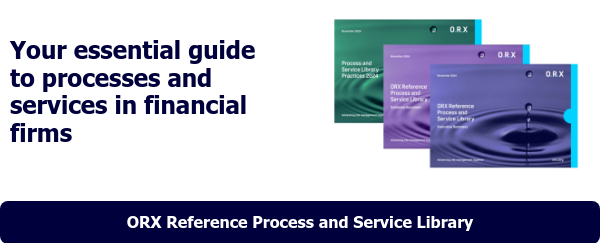The ORX Reference Process and Service Library is an industry-developed resource, created with McKinsey & Company as a knowledge partner and built using insights from 50 global financial institutions. It provides a shared structure to support better operational and non-financial risk (ONFR) management, helping firms benchmark, build and enhance their own process and service libraries.
As firms begin to embed the ORX Process and Service Library into their operations, the question shifts from “how does it work?” to “how can it be applied most effectively?”. This blog highlights four leading practices for using the library to strengthen both risk and process management.
Adopt a top-down approach
Many firms have found success by developing their library from the top down, beginning with a high-level view of core services and processes before layering in detail. This promotes a manageable level of detail and allows a firm to focus its resources on the key processes and services, as well as to identify potential risk and control or efficiency hotspots more easily.
By focusing first on services and critical processes, you can shape a more streamlined and manageable library - one that is flexible enough to evolve but focused enough to deliver immediate value. You can find out more about the typical size and structure of member libraries in our ORX Process and Services Practice Paper.
50
firms shared data
60000
data points shared
Develop a library that serves multiple purposes
There are many potential risks and process management uses for a process and service library, summarised further in the ORX Process and Services Practice Paper. The practice of connecting the process and service libraries allows firms to maximise the potential benefits: it generates a single integrated view of the organisation, from which data points can be extracted for a variety of purposes. It is also helpful if the first line (1LOD) and second line (2LOD) management collaborate in the development of the library, as this promotes both higher quality libraries and organisational buy-in. Taking a broader perspective ensures your library becomes a foundational tool, not just for risk teams, but across the organisation.
“The financial services industry continues to increase in complexity and associated riskiness, driven by digitalisation, a reliance on an ecosystem of partners and suppliers, and new technologies. As a result, the need for robust end-to-end (e2e) process management is more apparent than ever."
ORX Reference Process and Service Library Executive Summary
Target the benefits of process, risk and control optimisation
There are clear benefits to be achieved by standardising, rationalising and optimising process, risk and control practices. Some examples of this shared by members include: the removal of unnecessary processes and/or controls; an increase in process and/or control automation; and a reduction in the number of RCSAs. This is done through the application of a trigger-based approach, which means that RCSAs are only completed when necessary,
rather than periodically.
As these resource savings are realised, they help offset the additional effort required to maintain a process and service library. Additionally, these benefits foster greater buy-in from first line (1LOD) management, which helps embed the library more effectively into everyday risk and control activities.
“We are delighted to have partnered with ORX to develop the Process and Service Library, which will be a valuable resource for the entire financial services industry,”
Daniel Mikkelsen, Senior Partner, McKinsey & Company
Support both horizontal and vertical governance
There are a variety of ways this can be achieved, including the introduction of a process owner role accountable for the end-to-end process, and the use of effective tools which support process management and risk management reporting. Processes and services data do not need to reside on the same system as risk data, but the systems need interconnectivity to easily link and report on the data. These practices help improve accountability, visibility and decision-making across complex, cross-functional services.
How to access the library
The ORX Reference Process and Service Library is available free to ORX members and also for non-member institutions to purchase on the ORX website.
Listen to our podcast for more insights
Find out about Introducing the ORX Reference Process and Service Library from our ORX Operational Risk Podcast.







